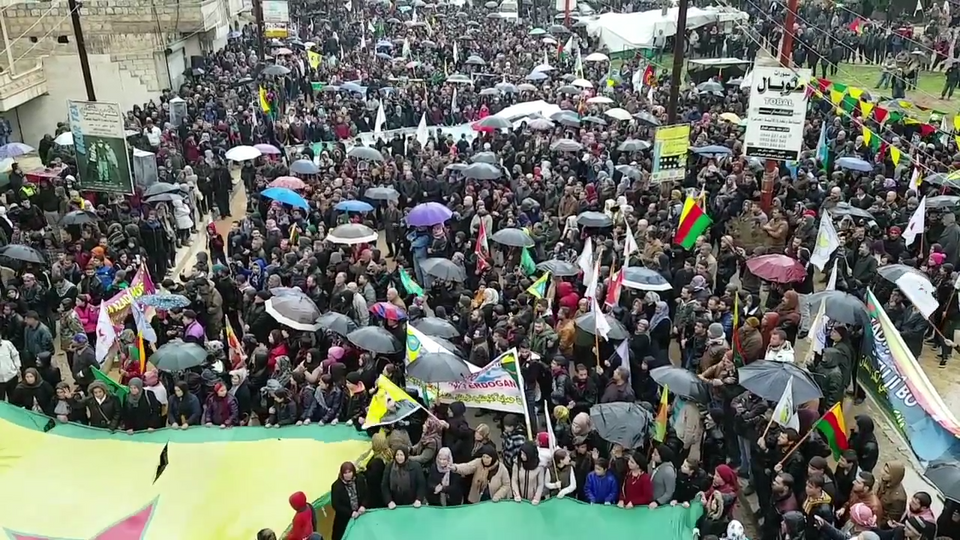
Slumping Turkish Currency Highlights Turkey’s Obligations in its Occupied Territories in Syria
In Northwest Syria, which in recent years adopted the rapidly depreciating Turkish lira, prices of basic commodities such as rice and tea have nearly doubled. Daily wages are now so undervalued that it is difficult to purchases even basic requirements. Skyrocketing prices have also impacted areas under the control of Turkish-backed militias that make up the Syrian National Army (SNA), such as Ahrar al-Sharqiyah and Al Mutasim Brigade. Fighters are paid in Turkish lira and their purchasing power has diminished significantly, leading to concerns that Turkey will not be able to control the groups who have already been accused of major human rights abuses. These abuses include illegal detention, forcible transfer of Syrians for trial in Turkey, and property crimes such as the confiscation of olive groves–all in violation of the law of occupation. Despite assurances from the Turkish government and SNA militias that they are clamping down on violations, there has not been any measurable progress on the ground. Deteriorating living conditions in Northern Syria caused by the depreciation of the Turkish Lira, which was unilaterally imposed upon the local population, has brought renewed focus onto Turkey’s obligations as an occupying power, particularly those related to the health and well-being of Syrians.
Turkey is an Occupying Power
Since at least 2016, Turkey has made incursions into Syria with its Operation Euphrates shield and subsequent operations, Peace Spring and Olive Branch. In 2019, SJAC concluded that by exercising effective control of parts of Norther Syria with a sustained military presence, imposing Turkish law and administering schools and other public functions, Turkey was an occupying power with very specific obligations incurred by the Fourth Geneva Convention. In September 2020, the UN High Commissioner for Human rights noted, “an alarming pattern in recent months of grave violations in these areas, including in Afrin, Ras al-Ain, and Tel Abyad, where increased killings, kidnappings, unlawful transfers of people, seizures of land and properties and forcible evictions have been documented.” She called on Turkish authorities “to respect international law and to ensure that violations committed by armed groups under Turkey’s effective control cease.” In its February 2021 report, the Syria Commission of Inquiry reached the same conclusion, noting that since Operation Euphrates Shield, Turkey had assumed obligations under the Fourth Geneva Convention, including “the full range of positive obligations under the law of occupation.”
Turkey must provide for Health, Education and Welfare
While there has been a focus on blatant violations of human rights by Turkish-backed militias in Northern Syrian, Turkey is also failing to meet its obligations under the law of occupation to ensure the general well-being of the population. For example, Turkey must facilitate the proper working of all institutions devoted to the care and education of children and, if possible, provide education by persons of their own nationality, language, and religion. Turkey has nevertheless flagrantly ignored that obligation by imposing mandatory education in the Turkish language.
In addition, Turkey must not requisition foodstuffs or medical supplies in the occupied territory. In fact, Turkey has the duty to ensure the local population has access to food and medical supplies, and if the resources of the occupied territory are inadequate in this regard then it should import the necessary foodstuffs, medical stores, and other necessary articles. If the areas under its effective control are not adequately supplied, Turkey must agree to relief schemes on behalf of said populations and facilitate them by all the means at its disposal. Rather than allow food products, such as olives, to be confiscated by militias under their control, Turkey must facilitate food aid in the opposite direction–particularly as the price of other basic foods such as bread have skyrocketed.
Turkey’s obligations further extend to the area of public health. The Fourth Geneva Convention specifically requires that Turkey maintain hospitals and ensure “the adoption and application of the prophylactic and preventive measures necessary to combat the spread of contagious diseases and epidemics.” While a recent report by Physician’s for Human Rights notes that “Turkey has made significant investments in the health care system in the areas it controls. It has also imposed a piecemeal system of regulations that have hindered relief efforts.” In addition, while there has been a COVID-19 vaccine program, it has been hampered by vaccine hesitancy and a critical shortage of treatment options and qualified personnel.
Conclusion
Given the economic crisis embroiling the Turkish government, it has likely deprioritized its attention to the proper administration of its occupied territories in Northern Syria. As such, Syrians living under a Turkish-administered economic system have been disproportionately impacted by the devaluation of the Turkish lira. The basic livelihood of people of Northern Syria and their ability to buy basic foodstuffs must be subsidized in order to meet their basic needs. Turkey should facilitate the provision of relief to these areas. It should likewise cease its programs of education based on Turkish curricula. Finally, it should further bolster the capacity of hospitals to provide care to Syrians and to respond to the COVID-19 pandemic. These are the obligations Turkey has voluntarily undertaken by occupying land in Northern Syria.
______________________________________________________
For more information or to provide feedback, please contact SJAC at [email protected] and follow us on Facebook and Twitter. Subscribe to SJAC’s newsletter for updates on our work.